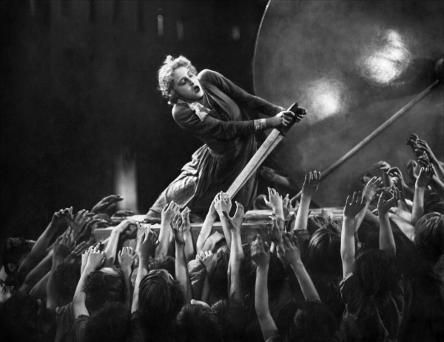FROM FILM REEL TO STAGE
The Film Humanity has evolved into an utopian society where its wealthy residents live a carefree life. One of those is Freder Fredersen, son of the founder and master of metropolis. On a rather uneventful day, he spots a beautiful woman with a group of children that he'd never witnessed within the boundaries of the city before. Trying to follow her, he unexpectedly learns of and is horrified to find an underground world of workers, who apparently run the machinery which keeps the above ground Utopian world functioning. Only a handful of people above ground know about the world below, one of which is Freder's father, Joh Fredersen. Freder learns that the woman is Maria, a radical thinker who espouses the need to join the "hands" - the workers - to the "head" - those in power above - by a mediator or the "heart". Freder wants to help the plight of the workers in the want for a better life. But when Joh learns of what Maria is spreading and that Freder is joining their cause, Joh, with the assistance of an old colleague and now nemesis named Rotwang, an inventor, works toward quashing a supposed uprising, with Maria as the center of their plan. However, Joh is unaware that Rotwang has his own agenda. The constant threat being that if any of these plans includes the shut down of the machines, total anarchy could break loose both above ground and below.[1]  [1] Helm, Brigitte (15 May 2010). "The Maria of the Underworld, of Yoshiwara, and I". In French, Lawrence. "The Making of Metropolis: Actress Brigitte Helm".Cinefantastique. Cinefantastique Online. Archived from the original on 9 July 2014. Retrieved 23 February 2012. | The Musical Treatment Joe Brooks and his co-creators have taken the theme and story of "Metropolis" and produced a very contemporary piece, while suggesting much of the mood of the original 1920's vision of the future. The central love story between Maria and Steven (named Freder in the film) has been fleshed out and given more weight of reality, while still remaining a classic case of "love at first sight" rarely seen out of the stylized world of musical theatre. The theme of the original, as described by "Metropolis" author Thea Von Harbou, is that "between the head and the hand there must be a mediator--that mediator must be the heart." The film has been criticized by some for the romantic simplicity of this theme. There is a greater sophistication in the musical's handling of this theme, which while still uncomplicated and altruistic, is more easily grasped and appreciated by modern audiences. In the film, Freder, in Christ-like fashion, is "re-born" through the influence of the Mother Mary-like character of Maria. He becomes the mediator between the common working class and his god-like father who created Metropolis, just as Christ is understood to be the mediator between mankind and God. The religious parallels are abundantly clear, and in the novel as well as the movie, the spiritual nature of the story and its themes are constantly underlined by religious imagery including a massive cathedral and white crosses in the shrine-like catacombs. In the musical, the ending scene in which the son literally takes "the hand of God" and "the hand of Man" and places them together for a handshake has been replaced by a scene which resonates more with modern sensibilities. As throughout the libretto, a dramatic warning about impending ecological disaster is clearly stated at the musical's conclusion. [2] [2] Kit, Borys (24 August 2011). "Musical Version of Silent Film Classic 'Metropolis' to Hit Theatres This Fall". The Hollywood Reporter. Archived from the original on 30 January 2014. |